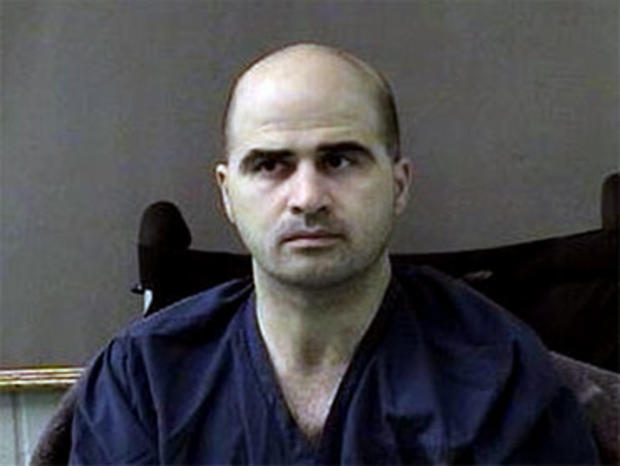Fort Hood Shooting: Victims to Confront Accused Nidal Hasan at Army Hearing
FORT HOOD, Texas (CBS/AP) For the first time in nearly a year, Army Maj. Nidal Hasan will come face to face Tuesday with dozens of people he's accused of attacking in last year's shooting rampage at Fort Hood.
PICTURES: Fort Hood's Fallen Heroes
An Article 32 military court hearing beginning today is expected to last at least three weeks, and will determine whether there is enough evidence to put the Army psychiatrist on trial.
Hasan, 40, is charged with 13 counts of premeditated murder and 32 counts of attempted premeditated murder. When the proceeding begins, he will be sitting just a few feet from the witnesses, who are expected to describe graphic details of the attack, which took place last Nov. 5, at one of the nation's largest Army posts.
The rampage lasted only about 10 minutes, until two Fort Hood police officers shot and wounded Hasan, who is now paralyzed. He remains in custody.
The dead ranged in age from 19 to 62 and came from all walks of life: a pregnant soldier who had just returned from Iraq and wanted a lifelong Army career; a woman who had joined the military after the 2001 terrorist attacks and had vowed to take on Osama bin Laden; and a young father excited about his first deployment.
Prosecutors have not said whether they would seek the death penalty if the judge determines there is enough evidence for a court-martial.
Such hearings are unique to military court, where prosecutors and the defense can call witnesses, and both sides are able to question them and present other evidence.
In the wake of the rampage, a disturbing picture of Hasan began to emerge. The American-born Muslim was trying to get out of his pending deployment because he opposed the wars in Iraq and Afghanistan. He recently had been saying goodbye to friends and neighbors, and had given away his Quran and other belongings.
But there had been warning signs much earlier. Some fellow students in a graduate military medical program complained to the faculty about Hasan after he reportedly gave a presentation that justified suicide bombings and said the war on terror was a war against Islam.
But no one filed a formal complaint, out of fear that doing so would appear discriminatory toward a Muslim student.
After the shootings, government investigations uncovered critical security lapses. A local terrorism task force run by the FBI had learned months earlier of Hasan's e-mail contacts with Anwar al-Awlaki, a radical Muslim cleric in Yemen who encouraged Muslims to kill U.S. troops, but the information was not adequately shared with the Pentagon.
An internal Pentagon review concluded that several medical officers at Walter Reed Army Medical Center failed to use "appropriate judgment and standards of officership" when reviewing Hasan's performance as a student, internist and psychiatric resident. Defense Secretary Robert Gates has said disciplinary action is possible.
According to government documents obtained by The Associated Press, Hasan's supervisors sanitized his performance appraisals during his residency at Walter Reed, even though he was described as a loner with lazy work habits and a fixation on his Muslim religion. He once appended "Allah willing" to a patient's medical chart.
Despite their concerns that he might have been developing a psychosis, no mental health evaluation was done, documents show.
MEDIA
PICTURES: Fort Hood's Fallen Heroes
